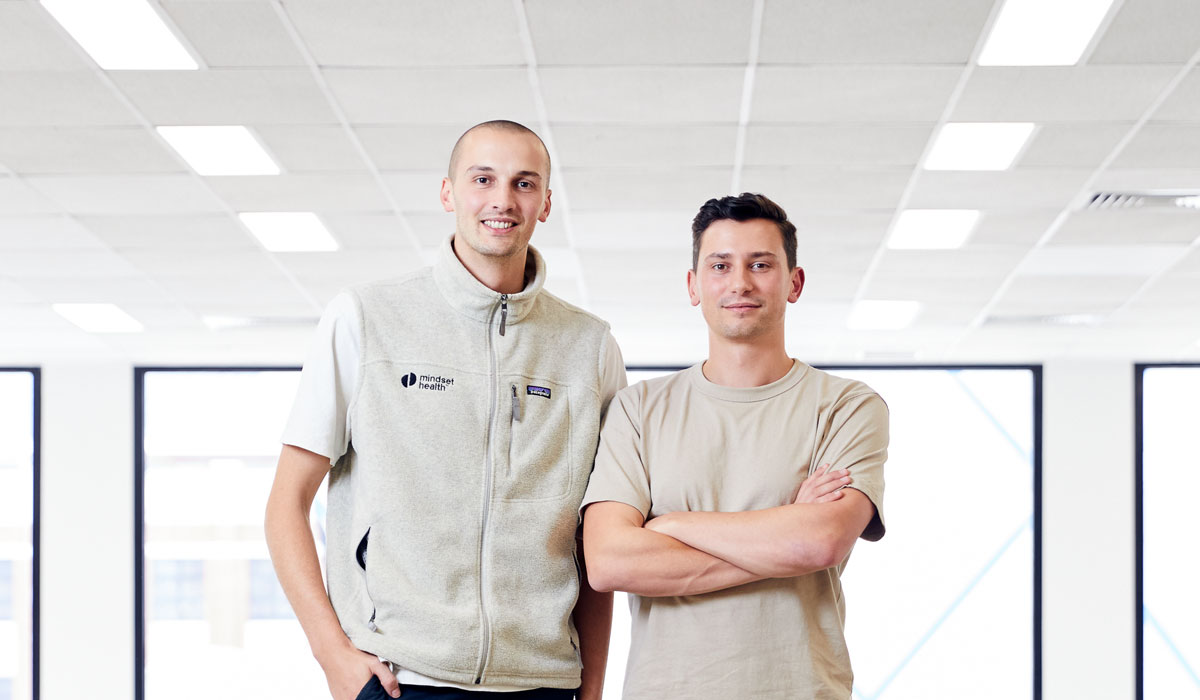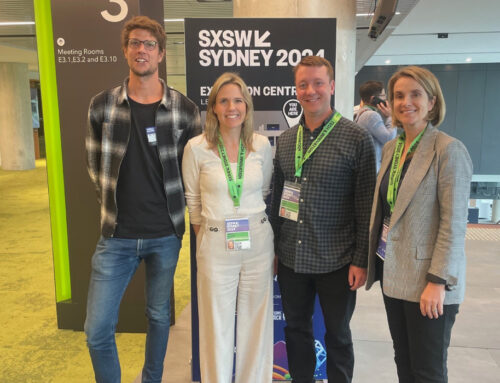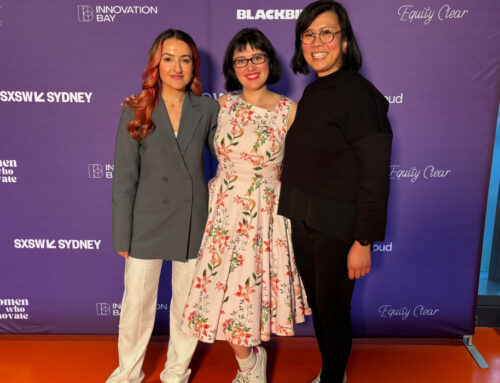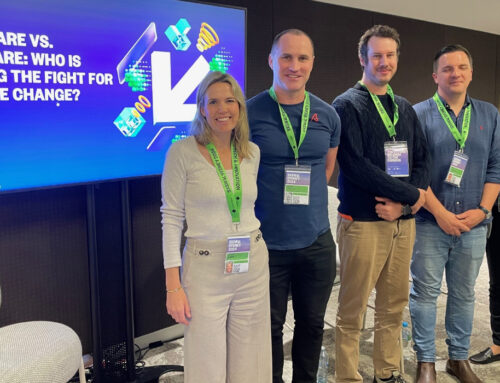Brothers Chris and Alex Naoumidis are arguably two of Australia’s most successful young entrepreneurs, aged 25 and 27 respectively, and when you consider the environment in which they were brought up you begin to understand why.
The co-founders of Mindset Health, an app that helps people manage symptoms of chronic conditions like Irritable Bowel Syndrome (IBS) through hypnotherapy that was recently valued at $77 million, grew up in Melbourne in an atmosphere that encouraged both entrepreneurial thinking and a positive mindset to influence change.
Their father Arthur Naoumidis embodies both. A successful and respected IT consultant and businessman, he founded several listed tech start-ups including local investment platform Praemium, before partnering with Blackrock Australia to launch the country’s first online separately managed account (SMA) platform. A regular user of hypnotherapy, he also brought up his sons to understand and believe in hypnotherapy’s profound potential.
“Growing up a big philosophy of our Dad’s was mind over matter, that your mind and therefore your brain regulates everything from pain perception to habits to addiction,” says Alex. “That idea of pure self-belief,” adds Chris, “that you can create a mindset that positively impacts your life was a big part of our upbringing and we wondered if we could bring that to more people.”
With hypnotherapy constantly evolving and becoming a proven tool for change, the brothers saw an untapped opportunity. Mindset Health was founded in 2018.
It wasn’t the brothers’ first foray into tech start-ups. They began creating apps in their teens before learning to code and in early 2017 they launched Covet, a dress-sharing app. It was their first real tech business and although it wasn’t ultimately commercially successful it taught them some valuable lessons, including the importance of focussing on something they were passionate about.
Chris was studying commerce with a major in finance and working part-time on Mindset Health, funded by Alex’s job as an accountant. Startmate funding enabled them to both quit what they were doing and focus their attention full-time on Mindset Health.
From the beginning their aim has been to convince people of the proven benefits of hypnotherapy, bringing it out of the fringes and into the mainstream. As a digital tool it could help people no matter what their income or where they were based.
“We combine world-class research and evidence-based therapeutic tools with best-in-class consumer experiences to create mobile apps that enable you to have expert support in your pocket, for 10 per cent of the price,” says Alex. “There is so much controlled research into hypnotherapy that shows it’s an effective tool. But because of misconceptions and the lack of access to qualified practitioners most people either couldn’t or wouldn’t get access. Once we could code we realised we could leverage those skills to make hypnotherapy mainstream, like Headspace and Calm did for meditation.”
The evidence, success rate, investment and subscriber base would indicate they’re onto something. In late March they completed an $18 million Series A round led by King River Capital, with investments from Tatterang’s Tenmile, Perennial Partners and impact investors Giant Leap and Alberts Impact Ventures. This followed a $6.7 million funding round in 2021 led by US angel investor James Beshara.
Mindset Health now offers three hypnotherapy-based apps to help people significantly manage the symptoms of IBS (Nerva), menopausal hot flushes (Evia) and smoking addiction (Finito), with programs addressing anxiety and depression due to launch in August. The company now has 31,000 paying subscribers, with 38 per cent of the market coming from the US, and 15 per cent each in Australia and the UK.
“We’re delighted to back Alex and Chris and the Mindset Health team on their mission to empower a billion people to improve their health by unlocking the power of the mind,” says Alberts Impact Ventures head of strategy Glenn Bartlett. “The combination of proven science and digital distribution is compelling, enabling access to people who would otherwise be excluded from life-changing interventions.”
Similar to meditation apps, Mindset Health uses pre-recorded digital hypnotherapy to help users manage their symptoms of chronic conditions through targeted programs developed by world-leading healthcare specialists. The recordings are either used independently or in conjunction with medication or other therapies such as cognitive behavioural therapy. Users are guided through hypnosis into a relaxed, focussed state, lowering their critical faculties so they learn more effectively, the unconscious mind more receptive to self-regulating symptoms such as gut irritation or temperature swings. They are then gently brought back to their alert state.
“Nerva essentially helps you address the miscommunication between your gut and your brain that can trigger IBS symptoms,” says Alex, who is coeliac and therefore has an intimate understanding of what it’s like to live with a chronic condition. “IBS is a physical condition, it’s just that you can regulate it with your brain. Menopause is a physical condition caused by changes in estrogen, it’s just that through hypnotherapy you can train your brain to regulate temperature changes – and therefore the hot flushes – with your mind.”
What makes Mindset Health stand out, the co-founders believe, is that research and hard evidence drives everything. “Everything we do comes from a research perspective,” says Chris. Their advisors include gut-directed hypnotherapist Dr Simone Peters, who has a PhD from Monash University; world-leading depression and hypnosis expert and clinical psychologist Dr Michael Yabko; and Professor of Psychology and Neuroscience at Baylor University in Texas, Dr Gary Elkins.
Research shows hypnotherapy works for the majority of people, with three out of four people responding to gut-directed hypnotherapy; while a vast majority responded to hot flush hypnotherapy. Dr Elkins’ co-authored 2005 study into clinical hypnosis for smoking cessation found users were 10 times more likely to abstain for one year than quitting without support.
Launched in mid-2019, Mindset’s flagship product Nerva was based on research and trials conducted by Dr Peters. Nerva has increased its subscriber base after it was recommended by various doctors, dieticians and gastroenterologists; and the company presented its research findings at two prestigious international gastroenterology conferences in 2022.
The programs are obviously different for different conditions – Nerva is a six-week program of daily 15-minutes sessions; while Evia runs for five weeks. Devised in conjunction with Dr Elkins, the newest program Finito is a three-week initial program supported by maintenance and relapse programs. “Chris and I used it to quit vaping,” says Alex. “That’s the next stage, because the app talks about ‘smoking’, but a lot of the approaches are similar.”
The Mindset Health team is currently 34-strong, based between Melbourne and Boston but they are actively hiring software engineers and people with healthcare and content experience. Meanwhile the research and constant finetuning continues. “We’re investing a lot more into personalising it to the individual so in the future it will be more personalised, like an in-person therapist,” Alex says.







